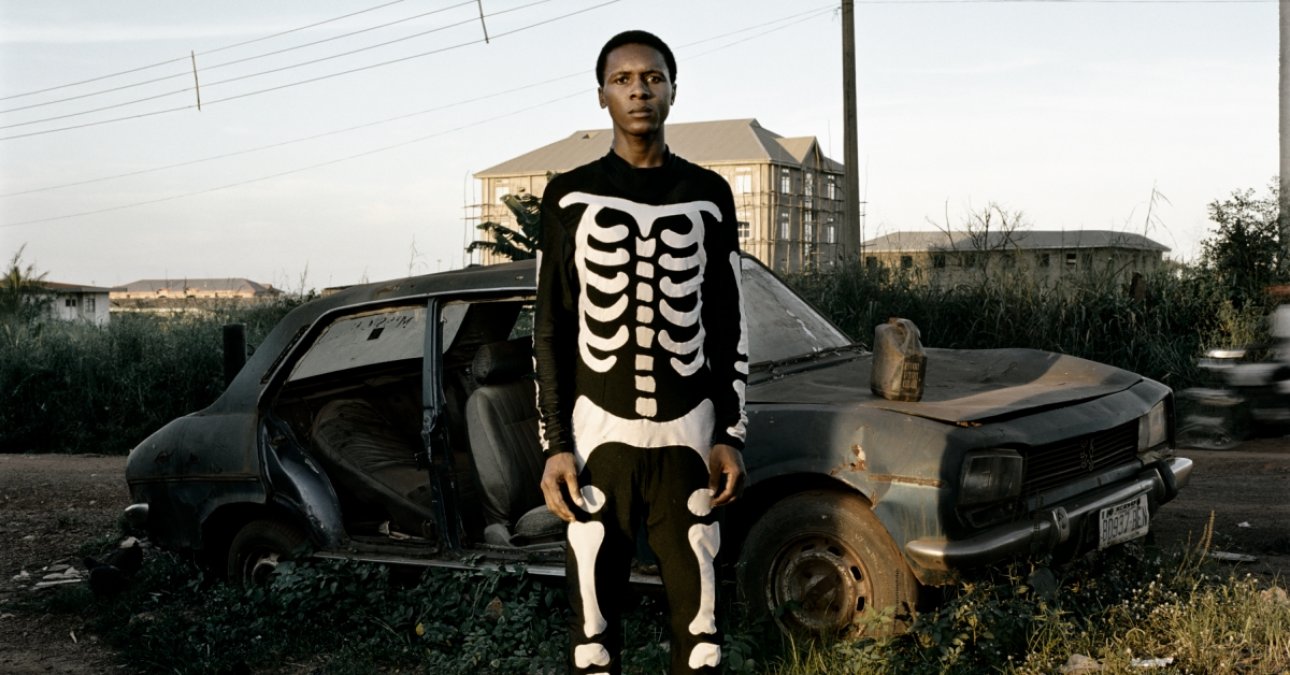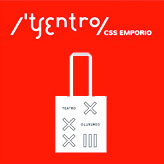Black Star
Fabrizio Arcuri / Fabrizio Sinisi
CREDITSMartin Chishimba
Michele Guidi
Aglaia Mora
Maria Roveran
stagehand Mario Iob
light technician Maurizio Tell
photo Pieter Hugo
stage photos Alice Durigatto
The text is constructed through four episodes that dialogue with each other in a non-narrative manner.
Four episodes: each with a different protagonist and a (seemingly) different story. In the first, a middle-aged woman falls in love with a beggar. In the second, a bloody news episode. In the third, a marriage crisis. In the fourth, a racially motivated raid on the outskirts of a big city. Each episode with its own language and genre: love quarrel, revenge tragedy, bourgeois drama, narrative theatre. Only one element unites these four scenes: the presence of a young Afro-descendant, an African immigrant named Grock, who traverses the events in an ambiguous and elusive way, gradually taking on the most diverse meanings: erotic body, political opponent, social victim, scapegoat. The show, however, will have a different development, which contemplates the four events, but articulates them in a subdivision into three acts without an interval.
Recalling Titus Andronicus, William Shakespeare's debut play, Fabrizio Sinisi and Fabrizio Arcuri bring to the stage with Black Star an ambiguous treatise on violence, and in particular on social violence linked to the presence of the foreigner: a merciless analysis of a society - ours - that deludes itself into believing that it has removed all forms of savagery from itself, but has only concealed its mechanisms. However, the sacrificial device is still there: invisible to the eyes of the majority, but no less bloody. The foreigner who crowds our cities continues, today as yesterday, to be the sacrificial victim of a cog as cruel as it is misunderstood. Black Star, with the forms of a theatre in verse and a prismatic structure, stands as a contemporary tragedy, highlighting the ferocious mechanism on which our world continues to be founded.
Director's notes
I believe that Black Star is a play that has digested and incorporated postdramatic instances and takes on the task of imagining an idea of theatre that needs to tell and share stories without the need to recreate an imitative process of reality.
It speaks of the West, of a senescent and depressed society that has power and economies but lacks the energy to face the future and uses what it has so that everything remains as it is, and this is the thread that binds all the episodes.
Shakespeare's Titus Andronicus is a hidden vein whose events are not retraced but which is drawn on to talk about violence in society.
Societies are built on dynamics of competition, and the logic of capitalism demands it too, but for this basic idea to hold and for societies not to implode in infighting, the mechanism of persecution and sacrifice, a scapegoat, must always be in place. This is the nature of violence and our inability to eradicate it.
Contemplating the possibility of the fact that it is not true that we are all the same and that we are born with the same potential; that we really do contain in our power all the good and all the bad that is possible and that it is not only the choices we make that change us but also and above all the circumstances in which we are born and grow up that make us more or less fortunate; I would like, after this long preamble, to take home a broader and more open look at the other and at diversity and to remind ourselves that we are fortunate citizens of a rich white state and of this part of the world and that this is not the result of our abilities or our choices but of luck.
Fabrizio Arcuri
Author's notes
Black Star is an essay on violence in four acts: four different 'modes of violence' - sentimental, personal, political, historical - which, like the teeth of a gear as invisible as it is implacable, compose a ferocious mechanism, the anatomy of an explosion.
Precisely because it constitutes the centre of the text, violence is never represented, but only said, recited, told. As in classical tragedy - of which this text tries to be an extreme contemporary rethink - in Black Star there is the conviction that violence can only be addressed when it is placed at the centre of language. Thus removing it from the space of the obscene to which we fearfully relegate it; and rather by saying it, acting it, crossing it. That violence which, more or less concealed, governs a large part of our public and private, political and personal practices; that violence which we try to recount here in the moment in which it spirals into a blind spiral, a vortex in which we can no longer distinguish the reasons and the wrongs, who starts and who begins, the aggressor and the assaulted, where and when it all began. That only apparently random moment in which society becomes the site of a pure clash of forces - the theatre of a sacrifice.
Fabrizio Sinisi
Fabrizio Arcuri is the director and founder, in 1991, of Accademia degli Artefatti. In addition to his work as artistic director and director for the company, he has always flanked an intense cultural promotion activity, and has signed important curatorships, artistic directions, for festivals, theatres, and events.
Since 2020, he has been co-artistic director of the CSS Teatro stabile di innovazione del FVG.
He was artistic director of the Teatro della Tosse in Genoa for the three-year period 2011 - 2013, programming consultant for 2014 and 2015, and curator of the International Festival Prospettiva for the Stabile di Torino from 2009 to 2015. For 11 years, in Rome, he has been in charge of the direction of the Massenzio International Festival of Literature and since 2006 he has founded and directed the Short Theatre festival. Among his many prestigious experiences, he was Luca Ronconi's assistant from 2005 to 2008, and resident artist of the Teatro Nazionale "Teatro di Roma" from 2014 to 2018. For four years he was the artistic director of the project La Festa di Roma until 2019, an idea of Roma Capitale - Assessorato alla Crescita Culturale for the New Year's Eve with the involvement of the main institutions of the Capital.
Some of his productions have won the most important Italian awards: in 2005 the Ubu Prize for the best foreign dramaturgical proposal with Martin Crimp's Three Easy Pieces. In 2010 the Critics' Prize with Spara/Trova il tesoro/Ripeti, the Special Ubu Prize for the Prospettiva festival. In 2011 he won the Hystrio Prize for directing. In 2020 he receives the Radicondoli Prize for Masters of Theatre from the National Association of Theatre Critics.
In 2022 he wins the special Ubu Award "for the seminal role of an artistic and organisational project that over thirty years has been able to create collective paths and encounters between artists of the contemporary scene, including festivals, reviews, shows and off-format objects. From the birth of Area06 and Short Theatre in Rome, through Prospettiva in Turin, the Teatro della Tosse in Genoa and the more recent experience at the CSS in Udine, Arcuri has shaped places of aggregation inspired by a plural vision. At the same time, the Artefatti company has in turn been a place of fruitful artistic encounters that have also branched out."
Fabrizio Sinisi. Playwright, poet and writer, in 2012 he made his debut as a playwright with La grande passeggiata directed by Federico Tiezzi. Since 2010 he has been dramaturg of the Compagnia Lombardi-Tiezzi and artistic consultant of the Centro Teatrale Bresciano. He works permanently with major national theatres, collaborating with the most important directors of the Italian scene. In 2017 he published Tre drammi di poesia (Three Poetry Dramas), with which he was selected among the ten Italian authors of the international project Fabulamundi. He collaborates with "Domani" and "Doppiozero". His works have also been translated and performed in Austria, Croatia, Egypt, France, Germany, Great Britain, Greece, Romania, Spain, Sweden, Switzerland and the United States. He was awarded the American Playwrights Project, the Testori Prize for Literature and the National Theatre Critics Award.
Images
Press reviews
Roberto Canziani, Decostruire il razzismo, fiabe nere e di violenza - Hystrio 1-2024 [393 Kb]Giuseppe Distefano, Black Star, ferocia e oscenità dell'Occidente al teatro Fabbricone di Prato - exibart.com, 23 dicembre 2023 [824 Kb]Marco Menini, Black Star. Sinisi e Arcuri sulla violenza sociale verso lo straniero - klpteatro.it, 22 dicembre 2023 [242 Kb]Renzo Francabandera e Matteo Brighenti, Black Star di Arcuri/Sinisi e la società dello spettacolo del male - paneacquaculture.net, 18 dicembre 2023 [934 Kb]Gabriele Rizza, Furore senza ritorno, favola nera sul presente - il manifesto, 16 dicembre 2023 [448 Kb]Sergio Lo Gatto, Black Star. Fiaba nera sulla violenza contemporanea - Teatro e Critica, 7 dicembre 2023 [256 Kb]Carlo Londero, Black Star, tragedia della violenza. Racconto amaro sulle nostre paure del diverso - FriuliSera, 7 dicembre 2023 [372 Kb]Paolo Ruffini, Black Star, il potere senza volto della violenza, liminateatri.it, 5 dicembre 2023 [708 Kb]Massimo Marino, Black Star: un saggio sulla violenza - doppiozero.com, 28 novembre 2023 [336 Kb]Mario Brandolin, Black Star, Un Occidente senza energie per il futuro - Messaggero Veneto, 23 novembre 2023 [1359 Kb]Roberto Canziani, Fabrizio Sinisi e Fabrizio Arcuri. Scrivere il teatro. Al presente - QuanteScene!, 22 novembre 2023 [310 Kb]Laura Zangarini, E' la violenza la 'stella nera' dell'Occidente - Corriere della Sera, La Lettura, 12 novembre 2023 [1439 Kb]Tour
premiere
23-24 November 2023, h 20.30
Stagione Teatro Contatto
Udine, Teatro Palamostre
tour
30 November 2023 h 20
1 December 2023 h 21
2 December 2023 h 19
3 December 2023 h 17
Turin, Teatro Astra / TPE Teatro Piemonte Europa
7–10 December 2023 – 20.45 week days, 19.30 Saturday, 16.30 Sunday
Prato, Teatro Fabbricone / Teatro Metastasio di Prato



















